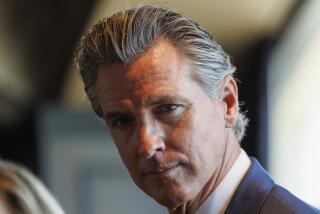POLITICS ’88 : Jackson, at Tarzana Center, Takes Credit for Congressional Action on Drug Fight
- Share via
The Rev. Jesse Jackson on Friday took credit for arousing Congress to consider nearly $3 billion in additional funds to wage a national war on drugs, and he criticized rival Michael S. Dukakis for not putting forth “a comprehensive plan” to battle drugs.
His remarks during an appearance at the Tarzana Treatment Center, a drug rehabilitation facility in the San Fernando Valley, echoed an interview published Friday, in which Jackson was quoted as saying that Dukakis’ drug war plan is “a farce” and described the Massachusetts governor as sounding like Vice President George Bush on various issues.
Jackson has made combatting drugs a centerpiece of his campaign for the Democratic presidential nomination, calling narcotics the “No. 1 threat to national security.”
Seen as Campaign Tactic
However, his effort to claim credit for heightening congressional interest in the war on drugs appeared to be part of an emerging campaign tactic to counter the risk of apathy among his supporters in the face of the growing lead in convention delegates accumulated by Dukakis. In various, indirect ways as the long primary season moves to the finish line with the last major contests in California and New Jersey on June 7, Jackson has been trying to rally his forces by suggesting that even if he fails to win the nomination, his campaign is having an impact not only on the Democratic Party’s agenda but also on national policy.
“By reviving the faith and hope of the people, we are winning every day,” Jackson often says.
Jackson also appears somewhat frustrated by Dukakis’ big lead.
In an interview published Friday in the New York Times, Jackson compared Dukakis to Bush, saying that “both of them brag about being vague. Both of them are trying to make bland beautiful. . . . Like Bush, Dukakis almost brags about putting forth no plans. Like Bush, Dukakis says I have not said anything concrete to anybody about anything.”
Huddles With Cuomo
In San Francisco Friday, Jackson spent more than an hour in a private meeting at the Hilton Hotel with New York Gov. Mario M. Cuomo, talking about what both men said were the Democratic Party’s prospects in November and the need to unify the party.
At a brief news conference that followed, Jackson said he valued Cuomo’s role as a “communicator” within the party who understands why Jackson wants to include a wide spectrum of views in the party and a policy agenda faithful to the party’s principles of social justice.
Cuomo, however, sought diplomatically to turn aside speculation that Jackson was using him as an intermediary to negotiate a role in the convention in July or define Jackson’s part in writing the Democratic platform in the likely event that Dukakis wins the nomination.
Both Dukakis and Jackson, Cuomo maintained, share “essentially the same vision” of the nation’s needs. The problem the party now faces, he noted, is one of translating this vision, which Jackson “articulates so well,” into a tangible program that can win in November.
Jackson did not elaborate on his criticism of Dukakis during public appearances Friday, except to refer to his own efforts at promoting the war on drugs.
Jackson said his constant prodding on the issue had given a “major impetus” to recent Senate passage of a bill that calls for $2.4 billion in additional federal funds to combat drugs.
The Senate measure, introduced in late March by Sen. Dennis DeConcini (D-Ariz.) was “remarkably similar” to a proposal for $3.8 billion in anti-drug funds that he outlined on March 10, Jackson said, contending that his campaign has in effect been “supplying the House and Senate with a national drug program.”
In addition, Jackson suggested, his protests on the campaign trail over cuts in the Coast Guard’s budget played a role in a House vote to slice $600 million from the Administration’s request for its Strategic Defense Initiative, also known as “Star Wars,” and to divert $350 million of that to the Coast Guard.
Jackson has proposed an ambitious anti-drug program that would include construction of 3,300 new drug treatment centers and immediate treatment on demand for an estimated 350,000 addicts.
He has also called for Western Hemisphere summit meetings to discuss the problem with Latin American leaders and has talked about encouraging substitute crops in the major source countries, although he has offered few details of how such a program would supplant a crop as lucrative as coca leaves, the raw material of cocaine.
In California each year, illegal drugs account for a $6-billion loss to the economy and more than 1,000 deaths, Jackson said, citing estimates from the National Institute.
Jackson would pay for his war on drugs and other social programs in part through a five-year freeze on defense spending.
More to Read
Get the L.A. Times Politics newsletter
Deeply reported insights into legislation, politics and policy from Sacramento, Washington and beyond. In your inbox twice per week.
You may occasionally receive promotional content from the Los Angeles Times.










